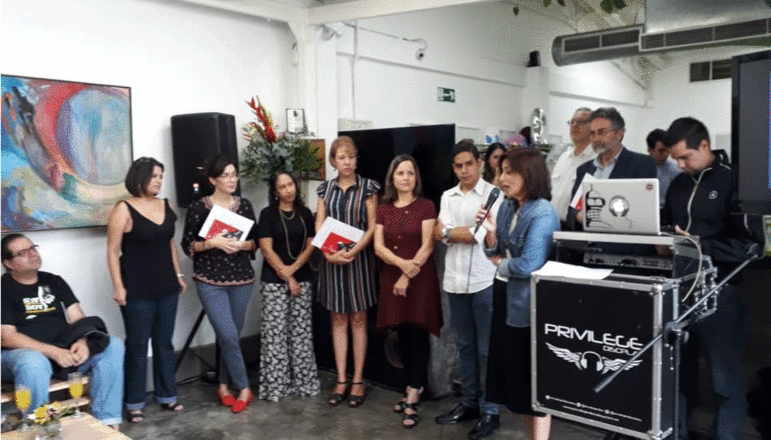

Collaborations Help Strengthen Journalism in Venezuela

Team Work: IPYS Venezuela director Nela Balbi speaks at the Eighth National Investigative Journalism Awards ceremony. Image: El Pitazo
Amid protests, human rights violations, social instability and an unprecedented food crisis, collaborative journalism is getting stronger in Venezuela. The alliances of independent media with reporters and editors from other countries have helped unearth issues that otherwise would have been kept secret by the pro-government agenda.
The relevance and impact of collaborative journalism was confirmed by the Eighth National Investigative Journalism Awards from Venezuela’s Instituto Prensa y Sociedad (IPYS).
“All the award-winning investigative projects are collaborations between reporters, not only within Venezuela, that has a network of digital journalists, but also with regional organizations, such as CONNECTAS, and organizations from other regions, such as the International Center for Journalists (ICFJ) and the Organized Crime and Corruption Reporting Project (OCCRP). These associations are important to understand that Venezuela’s problems expand beyond its border,” said Nela Balbi, director of IPYS Venezuela.
For eight years, IPYS has awarded the prize to recognize the best investigative reporting in Venezuela – except for 2017, when the competition was cancelled due to protests in the country.
In 2018, for the first time, the jury awarded the first place to two investigations. The first, titled “OLP: The Mask of Official Terror in Venezuela,” was produced by a team of reporters and designers at RunRunes.
Journalism security expert and former ICFJ Knight Fellow Jorge Luis Sierra shared with the team a number of tools for investigative safety. “He gave us protocols we had never followed before. Watching over our meetings and knowing how to communicate with each other when we were out on the field was new to us,” said Ronna Rísquez, one of the project’s authors.
The OLP story was spotlighted in the Washington Post and other media outlets, showing how these stories can have an impact beyond Venezuela’s borders.
Collaboration has also strengthened the use of new journalism techniques in a context of censorship and repression, as was the case with Julett Pineda and Edgar López from Efecto Cocuyo. These reporters, with support from the OCCRP and ICFJ, investigated how the Arco Minero project — promoted by former President Hugo Chávez — led to illegal mining, environmental damage and harm to indigenous communities in Venezuela.
The alliance between Efecto Cocuyo and reporters from other countries allowed them to use the Macroscope Media tool to access NASA’s satellite photos to confirm that more than 200 hectares were deforested between 2016 and 2017 by the mining project.
“This collaboration allowed us to confirm the environmental disaster that was taking place in the area we were investigating,” said Laura Weffer, editorial director and co-founder of Efecto Cocuyo. “It was a great interdisciplinary exercise because we went through many different stages, from street reporting in an abandoned and dangerous village, to the use of satellite images. It was collaborative journalism between people and between disciplines. I think that gave our investigation a different, innovative angle.”
This year the IPYS Awards were also open to foreign journalists who had conducted research and reporting in Venezuela, as was the case with Colombian journalist Hugo Mario Cárdenas of El País newspaper in Cali.
The investigation, “Venezuela, Crime Without Borders,” was supported by CONNECTAS as part of its partnership with ICFJ’s Initiative for Investigative Journalism in the Americas. The investigation proved how guerrillas and criminal gangs in Colombia are linked to Venezuela’s National Bolivarian Guard, and demonstrated how these groups control routes and extort and threaten traders.
Cárdenas traveled across the Colombia-Venezuela border and reported about what local journalists could not because of the risks. “This work is an example of what can be achieved with the support of ICFJ, CONNECTAS and their editorial advice,” he said.
Building transregional teams helps to investigate issues that the state tries to hide, said Balbi. Collaboration is about “fighting censorship, opacity and the lack of access to information that is affecting journalism in the country,” she said. “Through these partnerships and collaborative work, we have learned that we need to look for information wherever it is.”
This condensed translation first appeared on the IJNet website and is cross-posted here with permission. For more on the awards and winners, see the full piece on Connectas’ website.
 Priscila Hernández is a Mexican journalist specializing in coverage of human rights, people with disabilities and diversity. She is currently a journalist in residence at CONNECTAS in Colombia. In 2016, she received the Prize from the Initiative for Investigative Journalism of the Americas in the category of collaborative journalism. In 2009, she was recognized by the King of Spain Award.
Priscila Hernández is a Mexican journalist specializing in coverage of human rights, people with disabilities and diversity. She is currently a journalist in residence at CONNECTAS in Colombia. In 2016, she received the Prize from the Initiative for Investigative Journalism of the Americas in the category of collaborative journalism. In 2009, she was recognized by the King of Spain Award.









